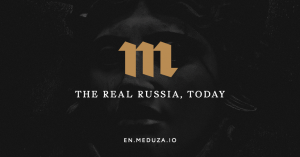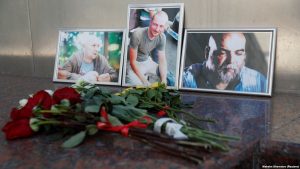Picture courtesy of Euromaidan Press.
The Havighurst Center’s fall lecture series continues with Anna Veduta: “Reporting on Russia.”
By Helen McHenry
Anna Veduta, Global Outreach director for Meduza News’s English branch, came to Miami on September 20 to speak about her experience as a journalist in Russia. Receiving her masters from Colombia, she also spent over two years as spokesperson to Alexey Navalny, the Russian opposition leader. Today she works with Meduza English in Washington, DC, the smaller but growing counterpart to Meduza’s main headquarters in Riga, Latvia.
Titling her lecture “A Song of Lies and Riot,” Veduta infused her presentation with imagery from Game of Thrones, using dragons as a symbol of various Russian-based news sources. She began by explaining how Meduza was created, citing the government crackdown on independent news sources following the 2011 protests over election fraud. Naming outlets such as Kommersant and RIA Novosti (which later became RT) that were punished for their coverage of these protests, she went on to highlight the event that eventually triggered the birth of Meduza: the 2014 annexation of Crimea.
Meduza’s predecessor, lenta.ru, covered the annexation and subsequent war honestly, calling it an annexation and including interviews from people on the ground who strongly resented Russia’s actions. The state viewed this as extremism, condemning lenta.ru for its publications – a clear act of censorship. Later that year, in October, 2014, Meduza “rose from the ashes of lenta.ru,” as Veduta put it, bringing to mind the birth of a dragon in Essos.
Veduta heightened the dragon imagery in her summation of today’s media landscape in Russia, with state-owned propaganda as a mature adult and independent sources as feeble fledglings. She portrayed Meduza’s Latvian headquarters as a young but fully-grown dragon and Meduza English, her “baby,” as an adolescent still “dependent” on the main branch, to paraphrase her sentiments. Although its position outside of Russia protects its journalists from censorship, Meduza’s website is under constant risk of being shut down in Russia.
Her focus then shifted to the grim reality of life in Russia as a journalist. Titled “the Price of Being an Investigator in Russia,” she told the story behind the murders of Orhan Dzhemal, Alexander Rastorguyev, and Kirill Radchenko and how they connect to the alleged poisoning of Pyotr Verzilov.
Picture courtesy of Radio Free Europe.
Dzhemal, Rastorguyev, and Radchenko were sent to the Central African Republic earlier this year to collect information regarding the activities of Russian mercenaries there. Given only the first name of their contact on the ground – who, as it turned out, was not the UN employee he said he was – the venture was ill-planned from the start. To make matters worse, the same organization who sent them in the first place, the Federal News Agency, is now investigating their murders.
Picture courtesy of Business Insider.
The trio planned to relay any information they found on the Russian mercenaries back to Russia via Pyotr Verzilov. Gaining a bit of fame for running illegally onto the field at the conclusion of this year’s FIFA World Cup as part of a planned action by the group Pussy Riot, Verzilov was hospitalized with all the symptoms of poisoning earlier this month – on the day he was to receive this information. Although Russian doctors insisted he was not poisoned, he was soon transferred to Berlin, where doctors found evidence to the contrary. He is now beginning a lengthy recovery process.
Although the latter half of the lecture painted a dark picture of Russian life, Veduta is not without hope. Over half of the reporters at Meduza are under 35 years of age, demonstrating the political activism of Russia’s younger generations. The thought brought a smile to her face, as she emphasized how positive this development is – they are paying attention to what is going on around them and are fighting back.
Anna Veduta’s perspective on Russian media shows that brutal government suppression is still very much at work in Russia. But her experience with Meduza News, as well as her insight on other independent news sources still working within Russia’s borders, offers an alternative to the propaganda of state-sponsored news. To return to the Game of Thrones analogy, the mature dragon of the state is powerful, but Meduza’s story shows that it is possible for a fledgling to mature and challenge the establishment. Veduta ended her lecture with the simplest of sentiments: “I hope you liked my dragons.”
The Havighurst Center’s lecture series will continue on Friday, October 26 with Mikhail Zygar, author and founding editor-in-chief of TV-Rain. He will be discussing truth and power in Putin’s Russia at 1:15pm in Harrison 204.
Helen McHenry is a sophomore majoring in International Studies and REEES.



